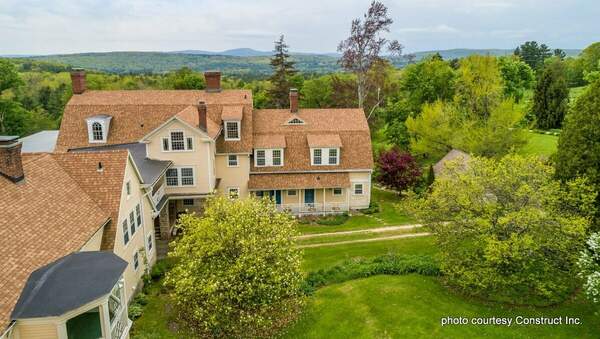Legislative Q&A: State Rep. Smitty Pignatelli
 |
With the session now over, and Pignatelli focusing on re-election against challenger L. Scott Laugenour, he met with us to discuss the his last two years in the House of Representatives.
From health-care reform to advocating for critical access hospitals, Pignatelli said everything — minus allowing casinos — will help pave a better future for the county's youth. iBerkshires peppered him with questions recently in his office in the Lenox Town Hall to find out what had happened and what is in store for whoever the 4th Berkshire representative will be in the next session.
Q: What are some of the highlights from last session?
SP: In my 10 years in the Legislature, I think far and away this was the most productive session we've had. I think we're finally getting out of the economic downturn that we've had. I think fiscally and financially we're in good shape.
There are only three states in the country that have a surplus over a billion dollars and Massachusetts is one of them. The other two are Texas and Alaska, which have clearly a heavy dependence on oil. I think that puts Massachusetts in a good light. I think we've weathered the storm. I think we were prepared for the storm and we weathered it very well. I think we made a real big investment in our partners in government, mainly local aid with record amounts of money going back to local aid and Chapter 70.
In addition to that I think we adopted some major legislative initiatives. Health care, that's a big one, the crime bill and the energy bill. I would put health care at the forefront of a great success of a session.
Q: The crime and the health-care bills were well covered so what other bills do you think were important?
SP: I think in economic development this year was all about jobs and really getting the economy back. Our unemployment rate is going down but we still have people who are unemployed or underemployed. We have some very talented people that are making a heck of a lot less money.
We have an opportunity to re-tool the mill worker from Lee who spent 25 years in the paper mill and lost their jobs in the last couple years and are now 45 years old. They were making $75,000, $80,000 a year. Let's give them the tools to retrain and prepare them for the next opportunity. I think those are the targeted investments we are making and I think it is going to be very important for us as we go forward.
I think the one big thing we did with health care in 2006 was have the mandate, which was great. This is the next big step in finding the affordability factor. We may health insurance but we still have not found the affordable product for you as an individual, for the families and the small business person. That can be the difference of 'do I pay my health care bill or can I afford a new employee.' I think if we can maintain that affordability, I think businesses will be able to take off and expand their work force.
I think they are tied together nicely. Jobs, jobs jobs and the affordability of health care.
Q: Were there any particular bills or amendments that you sponsored and are particularly proud of?
SP: I was the lead sponsor of the critical access hospital piece of legislation. There are only three critical access hospitals in the entire state and there will only be three. There are only 1,300 in the whole country. Fairview Hospital in Great Barrington, I would argue, is the economic engine of the Southern Berkshires but they were treated differently than other hospitals. I've been championing this critical access piece to increase their reimbursement. That's going to provide a great financial infusion into them and allow them to really expand other services and improve health care for Southern Berkshire County.
I'm very proud of that. That's been my top priority for this whole session and we were able to get it through. I'm really a local rep. There are two or three different kinds of legislators. There are the legislators that go down there and say they're going to solve global warming. That's not me. I'm not smart enough to figure that out. I'm really a local guy and we got some home-rule petitions for Lenox and Lee that allows them to do renewable energy projects.
Our infrastructure, roads and bridges, are critically important to these small towns that I represent but they are big-ticket prices. So we were able to secure some dollars for design money. The town of Lee, for example, has 14 1/2 bridges that are in different degrees of structural support.
The state will tell you to average $1 million a bridge. Now where does a small town of 5,000 people come up with $1 million a bridge when they own 14 1/2? We have to find ways to really get creative and I hope that the next Legislative session we make one of our top priorities to rebuilt our infrastructure. That'll spur economic activity, job creation, job growth. The guys who took the biggest hit over the last few years are the trades. I was an electrician prior to the Legislature and I know all about the trades. They've taken an inordinate hit in the last few years more than any other segment of the economy. If we can get people rebuilding our infrastructure, that's a step in the right direction.
The ongoing issues of regional school transportation, broadband or the lack of broadband, those are the items that have been around for a couple of sessions but we need to keep them on the front burner. I was at a dinner last night in New Marlborough and one of the issues that came up was broadband. They're still on dial up. They live in Monterey, New Marlborough or Sandisfield and still on dial up. That's an antiquated system. Here we are in 2012, soon to be going into 2013, and we have archaic broadband connectivity. We need to keep that on the front burner ... .
The potential for the Berkshires for home-based businesses will be largely based on their ability to connect with the outside world. That is going to be the greatest economic investment we can make as we go forward. Sen. [Benjamin] Downing and I have been working really hard on this for a number of years and until I can stand in the middle of Sandisfield and tell that Verizon guy, 'can you hear me now?' That's our mission. We've got to get this thing done and young people, who have greater minds than I have, can say 'I'm working out of my home, I can access the outside world no problem.'
We don't need the marquee business anymore. We don't need the bricks and mortar for the big businesses. We had 15,000 people working at General Electric. General Electric is not coming back but the potential for segments of that kind of industry can blossom all over if we have that connectivity and that's going to be an ongoing issue. Progress is being made in that effort and I think we are starting to see some success.
Q: How are you preparing for the next session and are there any particular bills you will be filing?
SP: I never want to be premature and the elections are there for a reason. My main focus between now and Nov. 6 is getting re-elected so I can talk about a next session.
If I am fortunate enough to get elected, I think the infrastructure will be my top priority. We're going to try to do that from Day 1. I'm already working with some of the communities in my district about building a plan and a strategy so that when we do hit the ground running in January, we are well prepared with the information that we need with the infrastructure necessity here in the Berkshires.
I am already working with MassDOT on an inventory of the condition of our bridges and maybe how much they will cost. I'm working with regional planning. I think the infrastructure is going to my biggest priority when the next session starts.
Q: Can you talk about you roles in varies committees this session?
SP: I advocated to be on higher education, which I think is very important for the Berkshires. I advocated for cultural development, which is what the Berkshires are becoming very quickly from North Adams to Sheffield, and I have long advocated that the Berkshires needs a voice on Ways and Means. Those were the three top committees I was on and blessed to be on.
I hope that will continue because those are the three areas where we will have the most sway in getting dollars back here or raising awareness on the needs of the Berkshires. As a father of a young daughter going off the college in a couple of weeks, I know firsthand the cost of education for our children and the need to increase student financial aid. This is K-through-lifelong learning. It is no longer K-through-12 or K-through-16 anymore. The days of getting out of high school and college and getting the gold watch from the company after a 45-year career, those aren't happening.
Guys like you and I will have three or four careers in those same 45 years today and education is going to be at the forefront of preparing people for those opportunities that lay before them. Our community colleges have done a great job across the commonwealth and none better than BCC in Pittsfield with preparing and conquering that next challenge.
Berkshire Community College, it's not your typical community college where it is that 17 or 18 year old kid out of high school. The average age is 25 or 26, some going for certificate degrees, some going for associates. Some of them, they are the first one going to college in their families. Education is going to provide them the opportunity to stay here. I think BCC is a far different school today than it was 10 years ago when I got into the Legislature. MCLA speaks for itself. Mary Grant has done a fantastic job.
Education, education, education and also providing opportunity for kids who may not be able intellectually or financially to go to college. But trying to find an opportunity for them to have a career in the Berkshires. There is always a need for tradesmen and service industry.
That segues into the cultural economy. If we can make it a year-round industry. The summer months sell themselves, but those shoulder seasons we always talk about, ... if we can make it a truly year-round culture destination, there are going to be a lot of opportunities for people to stay here. I that is one of our goals and objectives.
Q: We spoke about infrastructure and today the governor signed the transportation bond bill. Can you tell me about that?
SP: Bond bills, to be very frank, are kind of a wish list. It is not real money until the governor says OK.
I've got some things in there for Lee and New Marlborough about their bridges so now our next step is to lobby the governor on how important this is for these small towns. When we do a bigger transportation bond bill with actual real dollars for those bridges in Lee, New Marlborough or Great Barrington, we've got all the design work ready to go.
There won't be any delays. We can do the design work right now and be teed up a year from now when the real money comes in. My district will rise to the forefront of the priority list if we do preparation. The bond bill that the governor just signed has money that I advocated for so that we can be prepared when the real dollars hit the pavement. I think that is going to happen early next year so I am going to do everything I can to get these towns prepared.
I'm going to have the largest legislative district in the commonwealth of Massachusetts. There is going to be a lot of competing interest and there is also 351 other towns here in Massachusetts that are going to have similar concerns for their own districts. There is only so many dollars to go around but if we're ready and we can say 'hey governor, this one is already designed, we can be shovel ready right now, we can get a shovel in the ground next month,' that's going to make us sit very well so there are no more delays. We hear a lot about shovel ready projects but are they really ready? We want to get ready and that is why we're laying the ground work right now.
It's a blip on the radar screen. The infrastructure of Massachusetts has been ignored for 25 years. I always make the analogy that if you drive down Main Street right now you would drive by the Lenox Community Center and say this is a nice little town but by God the paint is falling off the wall. I don't think it is but as an analogy. But, the very road that you are driving on, the sewer pipes and water pipes that are six feet below the ground could be literally falling apart.
Infrastructure is not always the sexiest topic to deal with but it is critically important. Any selectman, any town manager, any city council or mayor, they'll tell you infrastructure, where all the money is, is out of sight, out of mind but definitely needed. It would provide some relief to the taxpayers if the state can step in and try to help them alleviate those costs.
Q: What were the bills that you were pushing but were never passed?
SP: One bill I was really passionate about — it's really complex so I hope I can explain it in a nutshell — would allow people to take money out of their individual retirement accounts and make a non-interest bearing loan to a nonprofit of their choice. I thought it would spur economic activity. For example, I am talking about people who are well-heeled and are taking the minimum distribution out of IRAs because they have to by law and not out of necessity, they would be able to peel off 10 percent of that and give money to say, Fairview Hospital, who wants to do a hospital expansion. That would spur the economic activity to really get other people to start thinking about it. Put it out to bid and put construction people to work, hire more doctors, more nurses. That's a very simple thing.
I'm simplifying it now but it is complex. There are a lot of moving parts when it comes to state laws regarding IRAs and the federal IRS. We addressed the federal IRS issues but we failed to adequately convince our colleagues about the local impacts. We'll keep pounding away at it.
I haven't gone into a session yet where I've said 'we're going to keep score and see how many bills we file or how many were passed.' I don't file a lot of bills because I've learned you have to be selective and targeted in this whole legislative process and you have to list your priorities ...
The things that we do in this office and my state office affect people's lives every day and we're all doing good things. But I don't believe I can ever do a press release about some of the things we do every day because it is really none of your business. Sometimes it is really personal, it's someone trying to find health care for their elderly parent or help in the school for a handicapped child, prescription medications for the young boy in Lee who became addicted to heroin and we were able to find him the help that he needed. I'm not going to send iBerkshires a press release saying Rep. Pignatelli helps heroin addict. It's not what I do, it's not who I am but it is something that when I go to bed at night I say 'I had a good day today' ...
I think you'd be alarmed at the phone calls we get each and every week. Things are kind of sad, sad stories. People needing fuel assistance, people our age, dual-income households, struggling to pay their fuel bill. People I grew up with and I say 'you've got to be kidding me, you are working, your wife is working.' Yeah, but it has been a bad year. It's catching up to everybody and nobody is immune from the ills of the world. They've hit home and we're there to help people out.
Q: You were also very active in the casino discussion. Can you recap that?
SP: We're going to have casinos in Massachusetts against my better judgement. I still think three is ridiculous. I think one is too many. But we're going to have them. I don't believe, especially for the Berkshires, it is going to be the economic boon that some people think it is going to be. I really don't believe it will be an economic boon for the state long-term.
You can build a casino today and, yes, there will be construction jobs but when that job ends, they've now become just another laid-off electrician, laid-off plumber, laid-off builder. Where is the sustainability with casinos? I don't think the economic panacea is going to be true. Let's talk in five years and see if revenues have reached expectations. I don't believe that. I think we are saturating the market.
It was sad because Massachusetts has been a leader in innovativeness, in entrepreneur attitude, has been the first in so many things in this entire country, and we just climbed on board and did what everyone else was doing. We turned to gamblers to pay our bills. I think it is a sad legacy to have. We have Nobel Prize winners for medicine at UMass. We have institutions of higher learning both private and public that attract students from all over the world. Yet, we're doing whatever Connecticut has done, Rhode Island and New Hampshire is talking about it, New York is doing it. We always had a different way of doing things and being very successful doing it. I was disappointed with the gambling. I voted against it four times and, unfortunately, this is the first time we had a leader in the House that advocated casinos and it passed this year.
Q: Can you talk about the budgeting process this year? What is good and bad about the budget?
SP: I've always had a good rapport with whoever the chair of Ways and Means is and I've got a great relationship with the chairman currently. When the speaker put me on Ways and Means eight or nine months ago, it kind of got me on the inside a little bit. I learned so much about the budget process more so than ever before.
I advocated for youth development. It is a real big issue with me. The Railroad Street Youth Program, which is my little pet project, has morphed into a countywide, Berkshire County youth development. We got an earmark for that. It's six agencies from Northern Berkshire to Railroad Street that is collaborating to raise those hopes and passions of young people in the Berkshires.
Mass mentoring, I was a champion of that. I think there are so many roles in every section of our economy where mentoring could make a difference in a young person's life. We had a nice increase in appropriations for that this year and that was one of my top priorities. I think we had some great success and our track record with youth development is really good.
Unfortunately, we still have a high teen pregnancy rate. We sadly have a high and sadly growing substance abuse dependency — it's not just about Pittsfield, it's about the Berkshires. This whole talk of the methadone clinic in the Berkshires, it is sad that we have to have those kind of conversations, if the demand wasn't here then there wouldn't be a supply. We need to recognize there is a problem here and we need to start dealing with these young people.
Folks at the United Way will tell you that part of the reason that those rates are so high is because young people lack aspirations. I hear that and said 'you've got to be kidding me.' Fourteen-, 15-, 16-year-old kids have no hope for a good future. We've got to do something about that. They lack aspirations and think this is their way out.
I talked to a young girl in this office last year and she was 14 years old, clearly very pregnant, and she was pushing another baby in a carriage. I said 'who's this little guy' and she said 'that's my son.' I asked how old and he was 2 years old. She had her first child when she was 12 years old in the Berkshires. Twelve years old. Was she having sex at 11? That's a sad commentary. I pulled her aside and said 'will you do me a favor and stop having sex?'
She said 'my mom had me when she was 15, we're doing OK.' She thinks what she is doing is OK to have two children by the time she is 14 years old. We've got to break that generational link to poverty and welfare. That's why all the things we've talked about are all interlinked. We need to raise aspirations so that it is not OK to have a child at 15. We have 30-year-old grandmothers in the Berkshires and 45-year-old great-grandmothers in the Berkshires. If we raise those aspirations somewhere in that generational chain, this young child won't be thinking about having a child at a young age, she'll be thinking about going to college.
Tags: Legislature, Pignatelli, Q&A, representative, State House,















